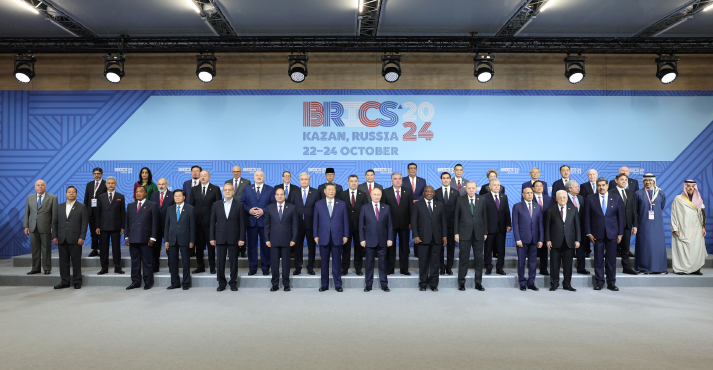
卓奥马尔特·奥托尔巴耶夫
观点

Participants of the BRICS Plus Leaders' Dialogue pose for a group photo in Kazan, Russia, on October 24
The recent BRICS summit in Kazan, Russia, was a remarkable success. It featured record attendance, insightful discussions and an ambitious outcome. Delegations from 36 countries and representatives of six international organizations participated. Leaders from eight BRICS member countries took part in the event in person, and Brazilian President Luiz Inácio Lula da Silva attended via video link due to an illness.
Given BRICS's main objectives and the successes it has achieved so far, many influential countries from the Global South have expressed interest in membership in the group. Russian President Vladimir Putin said over 30 countries have indicated their willingness to join "in one form or another." He added that it would be unwise to overlook the unprecedented interest from these nations. Nevertheless, he also emphasized that current BRICS members must manage the admission process carefully to maintain the association's effectiveness.
Following a significant expansion announced last year, BRICS is facing challenges in accommodating many countries within a single platform. Consequently, a decision was made in Kazan to establish "partner state criteria," which will guide further expansion.
BRICS has faced criticism for the lack of clarity regarding its activities. This criticism is somewhat justified, mainly because it has no formal charter and operates without formal bureaucracy, such as a dedicated secretariat. Additionally, decisions are made solely by consensus, naturally making reaching an agreement more challenging.
However, during the most representative and, therefore, difficult summit in the history of BRICS, the participants were able to adopt a solid document known as the Kazan Declaration, which comprises 134 points. The discussions and the final declaration highlighted several key themes, including the necessity to reform major international institutions such as the UN, the International Monetary Fund (IMF), the World Bank (WB) and the World Trade Organization. There was also significant emphasis on implementing the UN Sustainable Development Goals, combating climate change and addressing terrorism. (The Sustainable Development Goals were adopted by the United Nations in 2015 as the blueprint for global development efforts in the years leading up to 2030. The 17 goals aim to end poverty, fight inequalities and tackle climate change—Ed.)
The signing of the Kazan Declaration means that all BRICS members have agreed to all of its provisions. Two stand out among the many significant ones: the need for an alternative financial settlement system and the rejection of unilateral sanctions.
The declaration states that the member countries have agreed to explore establishing an independent cross-border settlement and depository infrastructure, referred to as BRICS Clear. Additionally, it includes a proposal to create an independent BRICS reinsurance capability.
The declaration welcomes the use of local currencies in financial transactions between BRICS countries and their trading partners. It also encourages strengthening of correspondent banking networks within BRICS and enabling settlements in local currencies in line with the BRICS Cross-Border Payments Initiative.
The dominance of the U.S. dollar and the SWIFT (Society for Worldwide Interbank Financial Telecommunication) system enables Western countries to exert excessive financial control and to use their currencies and payment systems not as neutral instruments for financial settlements but as political weapons. (SWIFT is a messaging system that facilitates rapid cross-border payments and is the principal mechanism for financing international trade—Ed.)
Many speeches by BRICS leaders emphasized that BRICS is not an anti-Western organization, and the member countries are open to cooperating with all nations around the world. They also highlighted the importance of protecting their national interests and rejecting political pressure on economic, financial and trade issues. For instance, the anticipated de-dollarization will not target third countries but will prioritize the use of national currencies for mutual settlements.
The declaration calls for the elimination of unilateral coercive measures, inter-alia in the form of unilateral economic sanctions and secondary sanctions that are contrary to international law. It is inappropriate to link these sanctions to developing countries' challenges in pursuing growth, such as maintaining sustainable supply chains and addressing climate-related and human rights issues. Instead of resorting to dictates or ultimatums, countries should encourage fair and equal cooperation to foster a more harmonious and safer world.
From the outset, BRICS members have pointed out that Western countries unfairly monopolize the leadership in critical global financial institutions, such as the IMF and the WB. Western countries refuse to adjust voting shares in these organizations to reflect the current global realities. For instance, the five founding BRICS countries—Brazil, China, India, Russia and South Africa—hold a combined voting share of only 14.15 percent in the IMF, and 14.34 percent in the WB. In contrast, their collective GDP at purchasing power parity (PPP) is nearly 37.4 percent of the global GDP.
In 2023, the estimated share of the EU and the U.S. in the global GDP based on PPP was approximately 14.46 percent and 15.56 percent, respectively. Despite this, a European consistently holds the position of managing director of the IMF, while the president of the WB is always reserved for an American.
The summit also demonstrated that Western attempts to isolate Russia have been ineffective. The West's direct political and economic pressure has been disregarded. What mistakes has the West made in its approach? Should it reconsider and change its policy toward the Global South? One thing is clear: The world has changed, potentially forever.
The BRICS summit was an evident success. Developing countries now have an organization that can serve as a source of support and hope for their continued development. The path toward consolidating Global South countries and their pursuit of progress will not be easy, but as the Chinese proverb states, "A journey of a thousand miles begins with a single step."
-
北京校区·海淀校园:北京市海淀区新街口外大街19号
北京师范大学京师学堂2F -
邮编:100875
-
邮箱:brs@bnu.edu.cn
-
珠海地址:广东省珠海市香洲区唐家湾金凤路18号
北京师范大学珠海校区励教楼 -
邮编:519085
-
邮箱:brs@bnu.edu.cn
-
北京校区·昌平校园:北京市昌平区沙河满井路
北京师范大学昌平校园1号教学楼 -
邮编:102299
-
邮箱:brs@bnu.edu.cn

码上关注



